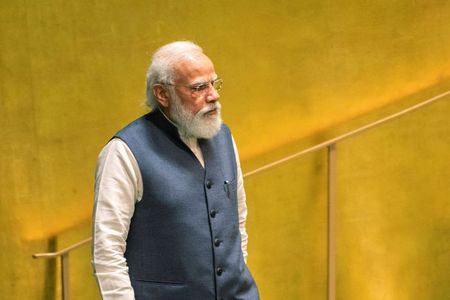
Exclusive: India PM Modi to attend Glasgow climate meet, environment minister says

By Neha Arora
NEW DELHI (Reuters) – Indian Prime Minister Narendra Modi will attend the U.N. climate summit in Glasgow, the environment minister said on Thursday, in a boost for efforts to agree steeper emissions cuts to tackle global warming.
India is the world’s third-biggest emitter of greenhouse gases after China and the United States, and Modi’s participation in the COP26 summit, which runs from Oct. 31 to Nov. 12, was seen as critical amid uncertainty over whether Chinese President Xi Jinping would attend.
Both India and China, which have not yet made stronger pledges to cut emissions, known as nationally determined contributions or NDCs, face pressure to do so at the conference. “The prime minister is going to Glasgow,” Environment Minister Bhupender Yadav said in an interview, adding that India was doing its bit to help tackle climate change.
Summit host Britain welcomed Modi’s decision to attend. “India plays an important role in this and the prime minister has had a number of conversations with Modi on the importance of climate change, so we look forward to discussing it with them further,” Prime Minister Boris Johnson’s spokesman told reporters.
Growing public pressure for action on climate change has spurred promises by countries and companies worldwide to contribute to the effort, which will be reviewed and amended at Glasgow. U.S. climate envoy John Kerry has visited India twice in the past few months to urge the Modi government to raise its climate ambition and consider a net zero commitment as scores of other countries have done.
Net zero means balancing out greenhouse gas emissions with actions such as planting trees, restoring soil and using technology to prevent emissions reaching the atmosphere. But energy-hungry India, which still relies heavily on fossil fuels, says it should not be expected to make deep carbon cuts like rich countries because it is a developing economy.
INDIA WEIGHS GLASGOW STANCE
India’s Cabinet, chaired by Modi, will decide the position to be taken at COP26, most probably within a week, an environment ministry spokesperson said. Yadav said India was doing its part to cut emissions. “India’s NDCs are quite ambitious,” he said. “We are doing more than our fair share. Our NDCs are more progressive than major polluters.” The country is on track to increase green energy capacity to 450 GW by 2030, he said. It has installed more than 100 GW of renewable energy, which accounts for more than 25% of overall capacity.
India has not yet committed to achieving net zero carbon emissions by 2050, considered a vital goal in limiting global warming to 1.5 degrees Celsius. Government sources have told Reuters that India is unlikely to bind itself to that goal, as tougher deadlines would hit demand growth that is projected to outstrip that of any other nation over the next two decades.
Last month, India’s chief economic adviser K.V. Subramanian said rich nations should commit much more than $100 billion to help poor countries fight climate change, due to their high historical share of emissions. “Even today, India’s per capita greenhouse emission is one-third of the world average,” Yadav said.
About 120 countries have submitted revised NDCs, but there is a lack of consistency with no common timeframe for meeting pledges.

















POST COMMENTS (0)